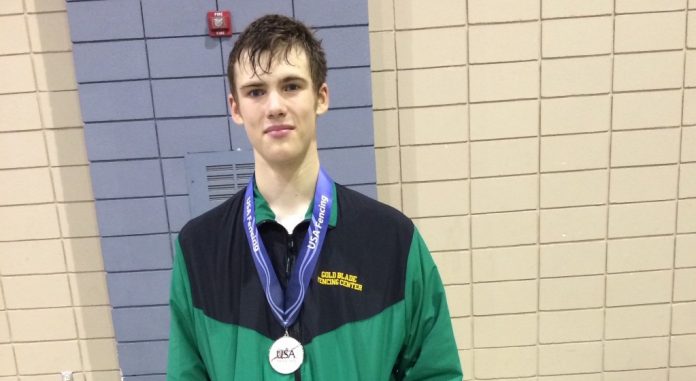Someone recently asked me, “Where is that sophomore on the fencing team? I haven’t seen him this year. Does he still go here?” I said, “He still goes here, and is on the team, but right now he is out of town, at a tournament.” They continued, “I was just wondering; he was in the yearbook.” “Is he any good?” they asked. “Well, it’s pretty hard to score on him during practice,” I said. When Jared Petroll ’18 got back, I found out a few things about his absence. He was in Richmond, Virginia, at a tournament, competing against the best fencers from around the country and winning second place. Yeah, he is pretty good.
Jared currently holds an A rating, the highest rating a fencer can have. This is not a rating given to just anyone; aside from placing second in Cadet (17 and under) men’s epee in the North American Cup (NAC) in October 2015, Jared also made top 16 in the same category at the November 2014 NAC, and 8th place D1 men’s epee at the Wang memorial tournament in March 2015. However, like many great athletes, Jared was not always this good.
Jared has been fencing for six years now and is currently a member of Gold Blade Fencing Center in Southlake, as well as a member of the Jesuit team. When he started fencing, Jared says that “[his] family didn’t really know what fencing was,” but they still supported him and found a good club for him to start at. Jared could not have reached the level he is at without his family, who provided “mental and financial support needed for fencing.”
No great athlete is without a great coach behind them, and Jared is no exception. Jared has had many coaches over the years, but his current coach, and coach of the Jesuit team, Mohamed Elsakhawy, has inspired him the most. Elsakhawy said that stamina “is the weakest part for [Jared].” He had to work with Jared to improve his stamina, as well as other things, such as “footwork, focus, technique, and tactics; he didn’t have these before coming to Jesuit.” Elsakhawy has helped Jared improve in these areas greatly, as they are crucial to being a successful fencer by “making him work like a high-level fencer at school practice and afterward for three hours at the fencing club every day.” Elsakhawy noted that “we fix a lot of his mistakes this way.” Jared agreed that Elsakhawy “was what drove me to finish second” during the NAC October. Elsakhawy was unable to be there to coach Jared because of surgery that he recently had. However, Jared acknowledged, “[Coach] believed I could win regardless, and because of this, I felt inspired to win.”
Jared believes that the hardest aspect of fencing is the mental aspect. During the NAC in October, he was exhausted after flying into Richmond, VA the day before, and waking up at six that morning. “Every part of me ached for the bout to be over.” However, he “forced [himself] to keep going,” overcoming the exhaustion that he felt by remembering how hard he had worked to get to this point. Using this focus and willpower, he was able to keep going and ended up winning second place in the tournament.
Of course, Jared does not keep this skill and experience to himself; he encourages and helps the younger or less experienced members of the team too. William Chu ’16 remarked that he “feels that Jared does a great job of being the role model for all the younger members” through his persistence and drive to improve, and that he “always has a positive mindset and treats everyone with the same respect.”
Now, in addition to helping his fellow teammates, Jared focuses on keeping up his skill and ability, pushing himself hard whenever he fences, whether in tournaments or at practice. Chu ’16 said that Jared always “pushes himself to his limits and never makes any practice easy for himself.” Chu added, “[Jared] always seeks to improve himself and really illustrates his love and passion for the sport” in many different ways, from “adding weights that he straps onto his arms or legs” to “watching fencing training routines.”
As Coach Elsakhawy put it,
“[Jared] has started climbing to the top, he isn’t quite there yet, but he will get there if he keeps up his work. Each fencer has a standard, like any other sport. Being on top means staying on top; one tournament is not enough to say he is the best, but he is still good, and will be even better in the future.”






